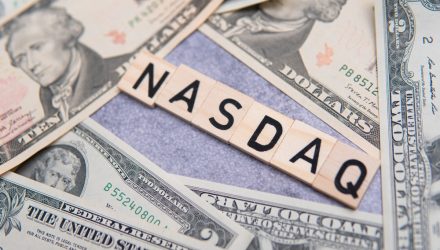In what amounts to some fun for indexing and something advisors and investors should be aware of, Nasdaq recently announced it is rolling out a special rebalance of the Nasdaq-100 Index (NDX).
That’s relevant to advisors and investors engaged with the Invesco QQQ (QQQ) and the Invesco NASDAQ 100 ETF (QQQM) – both of which follow NDX. The rebalancing act is also noteworthy because NDX is usually rebalanced just once a year, in December.
The upcoming special rebalance is prompted by Microsoft (NASDAQ: MSFT), Apple (NASDAQ: AAPL), and other tech darlings taking on usually large percentages of NDX. At the start of this month, the six largest holdings in QQQ and QQQM combined for about half of each ETF’s roster. This sparked concerns about concentration risk. Nasdaq is moving to ameliorate those worries, and the changes in QQQ and QQQM will take effect on July 24.
What Investors Should Expect
For the moment, Nasdaq hasn’t unveiled details on what the NDX rebalancing will look like. However, it’s a safe bet it will result in lower allocations to the likes of Apple, Microsoft, Nvidia (NASDAQ: NVDA), and other scorching hot mega-cap growth names.
“We expect the weights of the Magnificent Seven to drop, but not by an extreme amount. The percentage of assets in the index’s top 10 holdings has consistently perched above 50%,” noted Morningstar analyst Bryan Armour. “So, the adjustments are not expected to change the current level of 59% significantly. Nasdaq will publish the planned changes a week ahead of the rebalance, which we will update here when available.”
Overall, the changes in QQQ and QQQM aren’t likely to be monumental. They certainly won’t be cause for alarm among investors. If anything, the upcoming NDX adjustments will further highlight the advantages of the ETF wrapper over actively managed mutual funds.
“Mutual funds may be especially susceptible to capital gains distributions. An ETF like QQQ is among the most heavily traded securities in the United States, which results in plenty of opportunities for it to utilize in-kind creations and redemptions to purge low tax-basis securities, making capital gains distributions unlikely,” added Armour.
When NDX rebalances, billions of dollars of QQQ and QQQM member firms will be bought and sold. However, investors in those ETFs won’t be getting stuck with capital gains distributions. That’s a good thing. Plus, as Armour noted, downside in the names being sold should be limited because those are highly liquid stocks.
For more news, information, and analysis, visit the ETF Education Channel.








